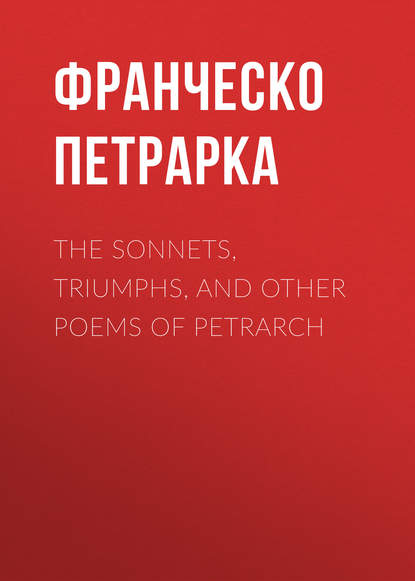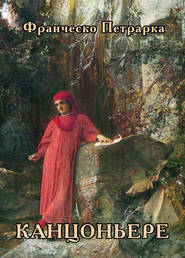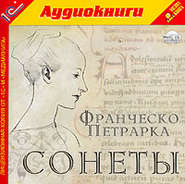По всем вопросам обращайтесь на: info@litportal.ru
(©) 2003-2025.
✖
The Sonnets, Triumphs, and Other Poems of Petrarch
Настройки чтения
Размер шрифта
Высота строк
Поля
When a low voice these sullen accents sung:—
"Not for himself, but those from whom he sprung,
He merits fate; for I detest them all
To whose fell rage I owe my country's fall."
"Oh, calm your rage, unhappy Queen!" I cried;
"Twice was the land and sea in slaughter dyed
By cruel Carthage, till the sentence pass'd
That laid her glories in the dust at last."—
"Yet mournful wreaths no less the victors crown'd;
In deep despair our valour oft they own'd.
Your own impartial annals yet proclaim
The Punic glory and the Roman shame."
She spoke—and with a smile of hostile spite
Join'd the deep train, and darken'd to my sight.
Then, as a traveller through lands unknown
With care and keen observance journeys on;
Whose dubious thoughts his eager steps retard,
Thus through the files I pass'd with fix'd regard;
Still singling some amid the moving show,
Intent the story of their loves to know.
A spectre now within my notice came,
Though dubious marks of joy, commix'd with shame,
His features wore, like one who gains a boon
With secret glee, which shame forbids to own,
O dire example of the Demon's power!
The father leaves the hymeneal bower
For his incestuous son; the guilty spouse
With transport mix'd with honour, meets his vows!
In mournful converse now, amidst the host,
Their compact they bewail'd, and Syria lost!
Instant, with eager step, I turn'd aside,
And met the double husband, and the bride,
And with an earnest voice the first address'd:—
A look of dread the spectre's face express'd,
When first the accents of victorious Rome
Brought to his mind his kingdom's ancient doom.
At length, with many a doleful sigh, he said,
"You here behold Seleucus' royal shade.
Antiochus is next; his life to save,
My ready hand my beauteous consort gave,
(From me, whose will was law, a legal prize,)
That bound our souls in everlasting ties
Indissolubly strong. The royal fair
Forsook a throne to cure the deep despair
Of him, who would have dared the stroke of Death,
To keep, without a stain, his filial faith.
A skilful leech the deadly symptoms guess'd;
His throbbing veins the secret soon confess'd
Of Love with honour match'd, in dire debate,
Whenever he beheld my lovely mate;
Else gentle Love, subdued by filial dread,
Had sent him down among th' untimely dead."—
Then, like a man that feels a sudden thought
His purpose change, the mingling crowd he sought,
And left the question, which a moment hung
Scarce half suppress'd upon my faltering tongue.
Suspended for a moment, still I stood,
With various thoughts oppress'd in musing mood.
At length a voice was heard, "The passing day
Is yours, but it permits not long delay."—
I turn'd in haste, and saw a fleeting train
Outnumbering those who pass'd the surging main
By Xerxes led—a naked wailing crew,
Whose wretched plight the drops of sorrow drew
From my full eyes.—Of many a clime and tongue
Commix'd the mournful pageant moved along
While scarce the fortunes or the name of one
Among a thousand passing forms was known.
I spied that Ethiopian's dusky charms,
Which woke in Perseus' bosom Love's alarms;
And next was he who for a shadow burn'd,
Which the deceitful watery glass return'd;
Enamour'd of himself, in sad decay—
Amid abundance, poor—he look'd his life away;
And now transform'd through passion's baneful power,
He o'er the margin hangs, a drooping flower;
While, by her hopeless love congeal'd to stone,
His mistress seems to look in silence on;
Then he that loved, by too severe a fate,
The cruel maid who met his love with hate,
Pass'd by; with many more who met their doom
By female pride, and fill'd an early tomb.—
There too, the victim of her plighted vows,
Halcyone for ever mourns her spouse;
Who now, in feathers clad, as poets feign,
Makes a short summer on the wintry main.—
Then he that to the cliffs the maid pursued,
And seem'd by turns to soar, and swim the flood;—
And she, who, snared by Love, her father sold,
With her, who fondly snared the rolling gold;
And her young paramour, who made his boast
That he had gain'd the prize his rival lost.—
Acis and Galatea next were seen,
And Polyphemus with infuriate mien;—
And Glaucus there, by rival arts assail'd,
Fell Circe's hate and Scylla's doom bewail'd.—
Then sad Carmenta, with her royal lord,
Whom the fell sorceress clad, by arts abhorr'd,
With plumes; but still the regal stamp impress'd
On his imperial wings and lofty crest.—
"Not for himself, but those from whom he sprung,
He merits fate; for I detest them all
To whose fell rage I owe my country's fall."
"Oh, calm your rage, unhappy Queen!" I cried;
"Twice was the land and sea in slaughter dyed
By cruel Carthage, till the sentence pass'd
That laid her glories in the dust at last."—
"Yet mournful wreaths no less the victors crown'd;
In deep despair our valour oft they own'd.
Your own impartial annals yet proclaim
The Punic glory and the Roman shame."
She spoke—and with a smile of hostile spite
Join'd the deep train, and darken'd to my sight.
Then, as a traveller through lands unknown
With care and keen observance journeys on;
Whose dubious thoughts his eager steps retard,
Thus through the files I pass'd with fix'd regard;
Still singling some amid the moving show,
Intent the story of their loves to know.
A spectre now within my notice came,
Though dubious marks of joy, commix'd with shame,
His features wore, like one who gains a boon
With secret glee, which shame forbids to own,
O dire example of the Demon's power!
The father leaves the hymeneal bower
For his incestuous son; the guilty spouse
With transport mix'd with honour, meets his vows!
In mournful converse now, amidst the host,
Their compact they bewail'd, and Syria lost!
Instant, with eager step, I turn'd aside,
And met the double husband, and the bride,
And with an earnest voice the first address'd:—
A look of dread the spectre's face express'd,
When first the accents of victorious Rome
Brought to his mind his kingdom's ancient doom.
At length, with many a doleful sigh, he said,
"You here behold Seleucus' royal shade.
Antiochus is next; his life to save,
My ready hand my beauteous consort gave,
(From me, whose will was law, a legal prize,)
That bound our souls in everlasting ties
Indissolubly strong. The royal fair
Forsook a throne to cure the deep despair
Of him, who would have dared the stroke of Death,
To keep, without a stain, his filial faith.
A skilful leech the deadly symptoms guess'd;
His throbbing veins the secret soon confess'd
Of Love with honour match'd, in dire debate,
Whenever he beheld my lovely mate;
Else gentle Love, subdued by filial dread,
Had sent him down among th' untimely dead."—
Then, like a man that feels a sudden thought
His purpose change, the mingling crowd he sought,
And left the question, which a moment hung
Scarce half suppress'd upon my faltering tongue.
Suspended for a moment, still I stood,
With various thoughts oppress'd in musing mood.
At length a voice was heard, "The passing day
Is yours, but it permits not long delay."—
I turn'd in haste, and saw a fleeting train
Outnumbering those who pass'd the surging main
By Xerxes led—a naked wailing crew,
Whose wretched plight the drops of sorrow drew
From my full eyes.—Of many a clime and tongue
Commix'd the mournful pageant moved along
While scarce the fortunes or the name of one
Among a thousand passing forms was known.
I spied that Ethiopian's dusky charms,
Which woke in Perseus' bosom Love's alarms;
And next was he who for a shadow burn'd,
Which the deceitful watery glass return'd;
Enamour'd of himself, in sad decay—
Amid abundance, poor—he look'd his life away;
And now transform'd through passion's baneful power,
He o'er the margin hangs, a drooping flower;
While, by her hopeless love congeal'd to stone,
His mistress seems to look in silence on;
Then he that loved, by too severe a fate,
The cruel maid who met his love with hate,
Pass'd by; with many more who met their doom
By female pride, and fill'd an early tomb.—
There too, the victim of her plighted vows,
Halcyone for ever mourns her spouse;
Who now, in feathers clad, as poets feign,
Makes a short summer on the wintry main.—
Then he that to the cliffs the maid pursued,
And seem'd by turns to soar, and swim the flood;—
And she, who, snared by Love, her father sold,
With her, who fondly snared the rolling gold;
And her young paramour, who made his boast
That he had gain'd the prize his rival lost.—
Acis and Galatea next were seen,
And Polyphemus with infuriate mien;—
And Glaucus there, by rival arts assail'd,
Fell Circe's hate and Scylla's doom bewail'd.—
Then sad Carmenta, with her royal lord,
Whom the fell sorceress clad, by arts abhorr'd,
With plumes; but still the regal stamp impress'd
On his imperial wings and lofty crest.—














